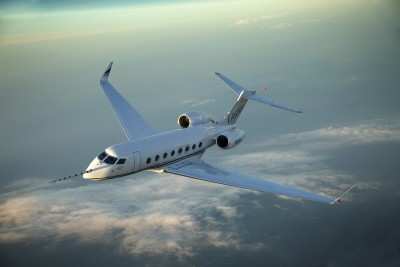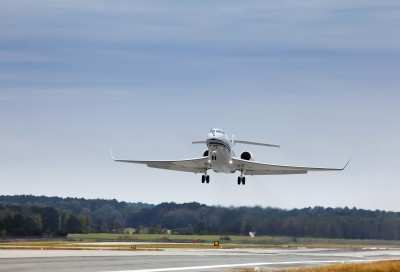Thu, Jan 13, 2011
Gulfstream Says First Flight Ever Using Electrically Powered
Flight-Control System
Gulfstream Aerospace Corp. test pilots and flight-test
engineers recently made business-aviation history when they flew
the Gulfstream G650 flight-test aircraft for the first time using
only an electrically powered, fly-by-wire backup flight-control
actuation system. Gulfstream's Serial Number (S/N) 6001 flew for a
total of 3 hours and 33 minutes on Dec. 21, 2010. Test pilots
Jake Howard and Gary Freeman along with flight-test engineers Bill
Osborne and Nathaniel Rutland evaluated the fly-by-wire system in
electric backup actuation mode for 2 hours and 20 minutes of the
flight, performing five landings with the backup system engaged.
"It flew so well that unless pilots were told they were in backup
actuation mode I don't think they would notice," said test pilot
Freeman.

File Photo
"The system performed flawlessly," said Pres Henne, senior vice
president, Programs, Engineering and Test, Gulfstream. "There was
no difference in handling qualities between the electrically and
hydraulically powered modes."
Typically, fly-by-wire uses a third hydraulic system to provide
redundancy in the event of a dual hydraulic system failure.
However, Gulfstream's fly-by-wire architecture uses electric backup
hydraulic actuators (EBHA): electrically controlled actuators that
are primarily hydraulically powered but offer electric power as a
backup. A self-contained hydraulic reservoir and motor pump allow
full operation should hydraulic loss occur.

The G650 has an EBHA at every primary control surface (elevator,
rudder and aileron) as well as the outboard spoiler. These provide
enhanced safety and aircraft availability because of the two
different power sources. The self-contained actuators also offer an
advantage following extremely rare failure scenarios, such as a
rotor burst.
The Dec. 21 G650 flight began with evaluating the electric
backup-mode handling qualities in one axis and then progressed to
full evaluations in all axes (pitch, roll and yaw). The test
conditions consisted of all flap settings at 10,000 feet for speeds
ranging from 1.13 reference stall speed (VSR) to maximum flap
extended speed (VFE). Cruise configurations were evaluated at
FL280, FL350 and FL450 and the full speed spectrum. The pilots also
initiated an emergency descent profile from FL450 to FL250.
Additionally, they evaluated handling qualities in the landing
configuration by making multiple offset approaches at Brunswick
Golden Isles Airport in Brunswick, Ga.
More News
Outboard Section Of The Right Wing And The Right Flap Separated In Flight And The Airplane Impacted A Farm Field Analysis: The pilot was approaching his destination airport under i>[...]
Final Approach Fix The fix from which the final approach (IFR) to an airport is executed and which identifies the beginning of the final approach segment. It is designated on Gover>[...]
"Our choice of when to respond, how to respond and on which targets to respond is a consideration that we make every time... Netanyahu also noted that anyone attacking Israel &ldqu>[...]
Estimated (EST) When used in NOTAMs “EST” is a contraction that is used by the issuing authority only when the condition is expected to return to service prior to the e>[...]
Aero Linx: Coalition of Airline Pilots Associations (CAPA) The Coalition of Airline Pilots Associations (CAPA) is the world’s largest pilot trade association representing ove>[...]
 NTSB Final Report: Cessna 177B
NTSB Final Report: Cessna 177B ANN's Daily Aero-Term (05.08.25): Final Approach Fix
ANN's Daily Aero-Term (05.08.25): Final Approach Fix Aero-News: Quote of the Day (05.08.25)
Aero-News: Quote of the Day (05.08.25) ANN's Daily Aero-Term (05.09.25): Estimated (EST)
ANN's Daily Aero-Term (05.09.25): Estimated (EST) ANN's Daily Aero-Linx (05.09.25)
ANN's Daily Aero-Linx (05.09.25)




